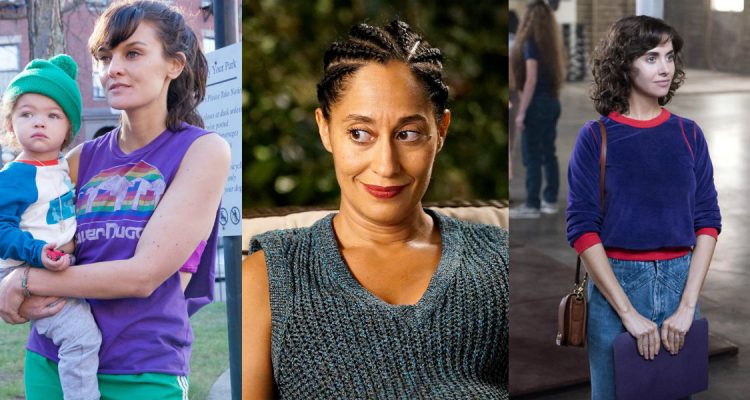THR continues their fascinating Emmy Roundtable discussions with moderator Lacey Rose, this week focusing on the Comedy Actresses. The hour-long episode features Drew Barrymore (“Santa Clarita Diet”), Alison Brie (“GLOW”), Rachel Brosnahan (“The Marvelous Mrs. Maisel”), Debra Messing (“Will & Grace”), Tracee Ellis Ross (“Black-ish”), Molly Shannon (“Divorce”), and Frankie Shaw (“SMILF”), as they discuss everything ranging from auditioning to the controversy surrounding the “Roseanne” revival and how gender politics have changed in the era of the Time’s Up movement.
The conversation touches on a number of aspects of creating a TV show, but all the actresses, unfortunately, have a horror story to tell about the auditioning process. Frankie Shaw remembered, “One time I was in an audition for ‘House of Lies,’ and the casting director said I needed to show more skin. She actually took the shirt off her back and gave me her tank top. I still didn’t get the part.”
Moving the conversation to their contemporaries, Debra Messing is the first to address the “Roseanne” controversy (the episode was shot before Roseanne Barr was fired) noting, “In a perfect world, we take on a different character, one that’s separate from ourselves. The thing that has made ‘Roseanne’ and Rosanne so … divisive is that, in its day, it was one of the greatest shows ever, and it really pushed the boundaries, but she made it clear from the beginning that this was her – she said, ‘I’m just being me.’ That’s very different from saying, ‘I’m creating a character.’ And then when you have someone who is very outspoken on social media and who says things like ‘Heil Hitler’ or that gay people are pedophiles or …”
When #MeToo and Times Up is brought up by Rose, Tracee Ellis Ross finds that “the conversation and the narrative are exactly the same, the thing that’s changed is the connection and the relationship with other women. There is a camaraderie now. If the Golden Globes is one weird example, that red carpet experience was especially different. It wasn’t about, like ‘Oh, I don’t want to share what dress I’m wearing because she might want to wear it.’ No, there was real … purpose.”
Each of these actresses shows are progressive because they have taken on tougher topics within the comedy realm, with Alison Brie, quoting co-star Betty Gilpin, describing her show as “a Trojan horse to get these real stories about women into men’s homes who expect to see girls in tiny clothes wrestling each other – but actually we’re smuggling in the truth and dynamic female friendships and heart.”
Brosnahan echoes those sentiments, believing that people are viewing ‘Mrs. Maisel’ “through a different lens, but it actually was created exactly as it was intended to be, this theme and idea of a woman discovering a voice that she didn’t know she had, it just resonates in a new way now”
The entire conversation is wide ranging and shows the amount of dedication each actress has to their show and the progressive nature they are bringing to the work. Check out the whole discussion below, next week features the dramatic actors roundtable.

